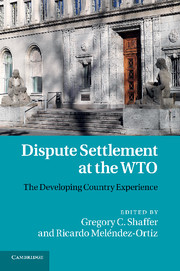Book contents
- Frontmatter
- Contents
- List of tables
- List of figures
- List of contributors
- Preface: The ICTSD dispute settlement project
- Introduction
- Part I Case Studies from South America
- Part II Case Studies from Asia
- 3 China's experience in utilizing the WTO Dispute Settlement Mechanism
- 4 Learning from the India–EC GSP dispute: the issues and the process
- 5 Thailand's experience in the WTO dispute settlement system: challenging the EC sugar regime
- 6 How the DSU worked for Bangladesh: the first least developed country to bring a WTO claim
- Part III Case Studies from Africa
- 10 Conclusion
- Index
- References
6 - How the DSU worked for Bangladesh: the first least developed country to bring a WTO claim
Published online by Cambridge University Press: 07 September 2011
- Frontmatter
- Contents
- List of tables
- List of figures
- List of contributors
- Preface: The ICTSD dispute settlement project
- Introduction
- Part I Case Studies from South America
- Part II Case Studies from Asia
- 3 China's experience in utilizing the WTO Dispute Settlement Mechanism
- 4 Learning from the India–EC GSP dispute: the issues and the process
- 5 Thailand's experience in the WTO dispute settlement system: challenging the EC sugar regime
- 6 How the DSU worked for Bangladesh: the first least developed country to bring a WTO claim
- Part III Case Studies from Africa
- 10 Conclusion
- Index
- References
Summary
Introduction
Trade between nations is increasingly being conducted under the rules and agreements negotiated at the World Trade Organization (WTO). The growing importance of the WTO in the conduct of trade affects the dynamics of negotiations over trade disputes. Many of these disputes can now be resolved through the various mechanisms set up by the WTO. This system may provide some advantages for smaller and weaker nations, in particular for least-developed countries (LDCs), who face a highly unequal position in trade disputes with larger and more powerful nations. Such countries can hardly expect to receive a fair deal when challenging trade-related disputes in bilateral negotiations with more powerful nations. Even without any explicit threat or arm-twisting, the negotiations are likely to move toward the desired outcome of the more powerful nation because of its greater economic and political leverage. The dispute settlement mechanism of the WTO requires the involvement of experts from several countries other than the disputants (beyond the consultation stage) and may offer an opportunity to level the playing field to some extent.
In 2004, Bangladesh became embroiled in a WTO trade dispute with its powerful neighbour, India. This chapter traces the events and circumstances that led to the imposition of anti-dumping duties by India on lead acid batteries imported from Bangladesh, an LDC that has encountered significant difficulties in diversifying its economy and export trade, especially as regards manufactured goods which were the target in this case.
- Type
- Chapter
- Information
- Dispute Settlement at the WTOThe Developing Country Experience, pp. 230 - 248Publisher: Cambridge University PressPrint publication year: 2010
References
- 1
- Cited by



